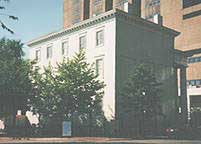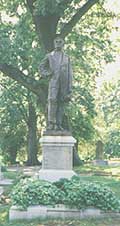
Jefferson
Davis in Richmond
 |
|
Jefferson Davis,
born in Kentucky and raised in Mississippi, knew
life as a boy on the plantation; as a soldier in
the field in the Black Hawk War and the Mexican
War, and then as a senator in Washington. But his
most famous residence was the Executive Mansion
in Richmond, Virginia, where Davis—as
President of the Confederate States of America
from 1861 to 1865—lived with his wife Varina
and their children. Here the Davis's enjoyed the
beauty and comfort of this stately dwelling, but
also suffered a great tragedy. In April 1864 the
couple's five-year-old son Joseph was playing on
the porch when he fell 15 feet below to his
death.
While Davis grieved over his personal loss, he
was soon beset by other woes. With the Southern
army's forces and supplies rapidly dwindling, it
would not be long before his dreams for the
Confederacy would be finished. |
Image
of Jefferson Davis care of Leib Image Archives.
|
 On April 2, 1865 General
Robert E. Lee sent a telegram to the War Department
advising the Confederate President to evacuate Richmond;
the end of the war was at hand. Davis turned pale as he
read the dreaded message that was delivered to him while
he sat in the pews at St. Paul's Episcopal Church. Acting
on Lee's advice, Davis and his cabinet fled Richmond that
night. The following week, on April 9, 1865, Lee
surrendered the army. On April 2, 1865 General
Robert E. Lee sent a telegram to the War Department
advising the Confederate President to evacuate Richmond;
the end of the war was at hand. Davis turned pale as he
read the dreaded message that was delivered to him while
he sat in the pews at St. Paul's Episcopal Church. Acting
on Lee's advice, Davis and his cabinet fled Richmond that
night. The following week, on April 9, 1865, Lee
surrendered the army.
 |
|
Though the war had
officially ended Davis's troubles continued to
pursue him. On May 2, 1865 President Andrew
Johnson offered a reward for his capture, and
eight days later Federal cavalrymen caught up
with Davis and brought him to Fortress Monroe in
Virginia. He remained imprisoned there for two
years and was never brought to trial. Upon his
release in May 1867, Davis returned once more to
Richmond.
Jefferson Davis later traveled abroad to Europe
and spent some time in Canada, then eventually
settled in his beloved home state, Mississippi.
From 1878 to 1881 he spent time writing a book, The
Rise and Fall of the Confederate Government. |
Despite having expressed his share
of disappointment and bitterness after the war, during
the latter years of his life he was reflective on the
outcome of the events, and was willing to put the past  behind him for the sake of the
future of the South. In his final speech that he
delivered in 1887, Davis proclaimed: behind him for the sake of the
future of the South. In his final speech that he
delivered in 1887, Davis proclaimed:
The past is dead; let it bury its dead, its hopes, and
its aspirations. Before you lies the future, a future
full of golden promise, a future of expanding national
glory, before which all the world shall stand amazed. Let
me beseech you to lay aside all rancor, all bitter
sectional feeling, and to take your places in the ranks
of those who will bring about a consummation to be
wished—a reunited country.
Jefferson Davis died in New Orleans in December 1889,
and was re-interred in Hollywood Cemetery in Richmond, on
May 31, 1893. His wife and children are buried beside him
in the Davis Circle.

Photos
of Richmond from the top: Davis's Executive Mansion,
known today as The Museum and The White House of the
Confederacy (by DLO); St. Paul's Episcopal Church (by
DLO); and Davis's bronze monument at his gravesite in
Hollywood Cemetery (by CNO).

Journal Index | Previous
Page | Next
Page
Back | Home
Copyright © 2001 - 2009 1st Dragoon's Civil War Site. All rights reserved.
Spider
Map Index
|


 On April 2, 1865 General
Robert E. Lee sent a telegram to the War Department
advising the Confederate President to evacuate Richmond;
the end of the war was at hand. Davis turned pale as he
read the dreaded message that was delivered to him while
he sat in the pews at St. Paul's Episcopal Church. Acting
on Lee's advice, Davis and his cabinet fled Richmond that
night. The following week, on April 9, 1865, Lee
surrendered the army.
On April 2, 1865 General
Robert E. Lee sent a telegram to the War Department
advising the Confederate President to evacuate Richmond;
the end of the war was at hand. Davis turned pale as he
read the dreaded message that was delivered to him while
he sat in the pews at St. Paul's Episcopal Church. Acting
on Lee's advice, Davis and his cabinet fled Richmond that
night. The following week, on April 9, 1865, Lee
surrendered the army. 
 behind him for the sake of the
future of the South. In his final speech that he
delivered in 1887, Davis proclaimed:
behind him for the sake of the
future of the South. In his final speech that he
delivered in 1887, Davis proclaimed: